#WuJi
Explore tagged Tumblr posts
Text
i love reading over and over about the same queer people falling in love😭🙏🏼
#thank you quotev#thank you wattpad#thank you livejournal#thank you deviantart#thank you archive of our own#thank you fanfiction.net#thank you individual fandom fanfiction websites#thank you tumblr#thank you webnovel#thank you asianfanfics#thank you commaful#thank you spacebattles#thank you fandom zines#thank you queer people#buddie#steddie#buckingham#destiel#byler#bakudeku#zukka#zukki#momojirou#monoshin#erasermic#seroiida#tsukasui#chyan#merthur#wuji
207 notes
·
View notes
Text
wei wuxian would probably be taller than lan wangji if he wasn't starved as a child. my guy was 186cm tall after being starved for 4-6 years, he would probably be like 190-195cm tall.
i love the idea that both wei changze and cangse sanren were also both freakishly tall, and because of that their kid is eye-level with nie mingjue or more, like dude. dude.
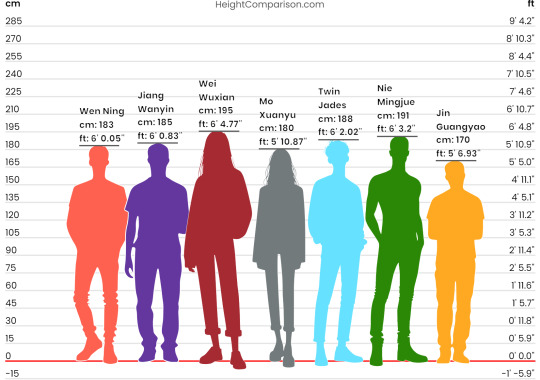
WWX: tallest person in jianghu
just for the record, wwx is canonically 186cm, but i think this is better! this also means that every modern au has tallxian, and i will not compromise on this >:3c
#wei changze & cangse sanren deserve to be a little a freakishly tall. as a treat#my little freaks#mxtx#mo xiang tong xiu#mdzs#mxtx mdzs#mo dao zu shi#the grandmaster of demonic cultivation#the grandmaster of diabolism#the untamed#chen qing ling#cql#wei wuxian#wei ying#wangxian#lan wangji#lan huan#lan xichen#mo xuanyu#nie mingjue#jiang cheng#jiang wanyin#wen ning#wen qionglin#meng yao#jin guangyao#wuji#wei wuxian x lan wangji#3zun#lan zhan
630 notes
·
View notes
Text
Things that Witch!Wei Wuxian knows: his next job is going to be a pain in the ass, he needs to figure out what (if anything) he's going to do for his twenty-two birthday, he has a video call with his sister tonight to discuss the mural he's going to paint in Jin Ling's nursery, and that the little bunny he just picked up from a dingy alley is definitely not a normal animal. No animal has bright golden eyes and a pissed off expression quite like this one. Will he still take it home? Of course.
Things that Witch!Wei Wuxian maybe knows: half a dozen purification potions and some talismans for repelling nightmares will likely do, he wants his siblings to be there, his nephew definitely won't get a peacock, he can't just upload a picture of the bunny to the MagiNet and hope that no one comes knocking with the intention of sacrificing the little guy—yeah, he checked—in some strange ritual. So he tells Jiang Yanli and trusts her to spread the word to sensitive people. Meanwhile, he makes sure the bunny is warm, full and rested, and only threatens to eat him a few times. Who can blame him! It's so fluffy, it triggers his cute agression. Also, it could easily be made of cotton candy. No one can really know with magical animals.
Things that Witch!Wei Wuxian definitely doesn't know: his job is about to be interrupted by a strange ass man accusing him of stealing his familiar, that is going to be interrupted by his brother calling him because guess what! His nephew is being born, and the little bunny that has been sleeping in his bed and hearing every thought that crosses his head and following him into the shower is actually a shape shifter. And not even any shape shifter: Lan Zhan, Wei Wuxian's old high school crush that turned him down so many times his story still gets told in the School of Magic for Young Practitioners. One Hundred and Thirteen Rejections Wei Wuxian, that's him.
Right up until Lan Zhan accompanies him to the hospital along a magically stunned Su She, who apparently had drugged him to make him stay in his animal form and try to force a familiar bond—which, yes, it's as heinous and illegal as it sounds. Dude is so going to jail. But whatever. The important part: why is Lan Zhan by his side while Wei Wuxian is holding Jin Ling for the first time? And why is he going home with him after? And why is he... confessing... his love for Wei Wuxian... and saying he wants to be his familiar...?
Oh. Oh.
And so they magically bound their souls for eternity. And Su She gets his wand broken as well as his hand by Lan Xichen!
#lan wanji#lan zhan#wangxian#wei wuixan#wei ying#mxtx mdzs#mdzs wwx#mdzs lwj#shapeshifter lan wanji#animal transformation#su she#lan xichen#falling in love#mo dao zu shi#the untamed#wuji#witch wei Wuxian#witch wwx
131 notes
·
View notes
Text

A Happy Wangxian!
#mdzs#the grandmaster of diabolism#mxtx#digital art#procreate#lan zhan#lan wangji#lwj x wwx#mo dao zu shi#wangxian#wuji
57 notes
·
View notes
Text
Xiao Zhan Studio YouTube - songs added
The studio has added a lot of songs to the YouTube account - the rest of the WM album and songs from various soundtrack performances, including songs from The Untamed.
youtube
youtube
youtube
60 notes
·
View notes
Text
hahaahahahhahahahh
#mdzs#mxtx#mo dao zu shi#wuji#wangxian#wei wuxian#wei ying#lan wangji#lan zhan#cql#chen qing ling#the untamed
75 notes
·
View notes
Text
the untamed (2019) be like: no this isn't a gay couple. yes LZ would travel to the end of the world with WWX. yes WWX let go of LZ to protect him (multiple times). yes LZ made a whole song for WWX. yes LZ recognises WWX after 16 years of death because of a single glance after one melody. that's just what the homies do
167 notes
·
View notes
Text
Whoever made Xiao Zhan and Wang Yibo (Wei Wuxian and Lan Wangji’s actors) sing the main ost of The Untamed, which is 無羁 (wú jī)— had made the best decision in the entire decision making world.
Whoever decided to name it 無羁 (wú jī) and make it the WangXian version (from the books/donghua) of the live adaptation, and also the one that Lan Wangji canonically composed as a theme song for him and Wei Wuxian — had made the second best decision in the entire decision making world.
Whoever decided to make the official English title of 陳情令 (chén qíng lìng) as “The Untamed” which also means “unrestrained” or “無羁 (wú jī)”— had made the third best decision in the entire decision making world.
Like it was so genius? Knowing that whenever you listen to 無羁 (wú jī), it’s Wei Wuxian and Lan Wangji themselves singing the song? Their theme song? And that even though they censored it, they still managed to make the song name a combination of their names (Wuxian + Wangji)? And that the literal English translation of 無羁 (wú jī) is “unrestrained” which can also mean “Untamed”?
youtube
#aside from wangxian#i’ll also be adding wuji in my tags from now on#the untamed#cql#lan wangji#lan zhan#wei wuxian#wei ying#wangxian#wuji#Youtube#xiao zhan#wang yibo#i’m sorry my thinking might be wild#but when i realized that wuji is also a combination of their names#the first thing i thought of was how wwx was written before lwj so it’s giving my bottom lwj rights 😂😂😂#which is acceptable (but i think in cql only? since book/donghua fans rage about the thought of bottom lwj)#but if u look at cql lwj i think theres no problem 😂#my useless essays
376 notes
·
View notes
Text
Módào Zǔshī Hanakotoba Analysis Part 2
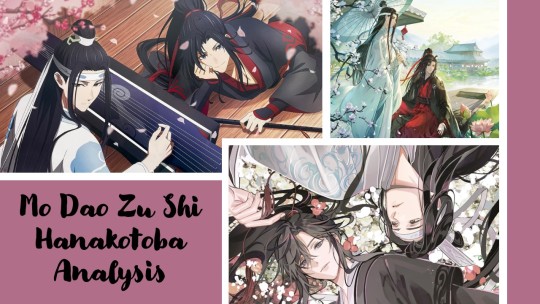
◤━━━━━━━━━◥✿◤━━━━━━━━━◥
-> 4) Lotus/Water Lily
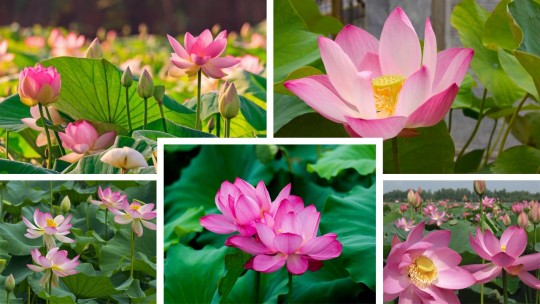


-> 4.1.) Lotus/Water Lily Flower Symbolism:
Despite having a few differentiating characteristics, lotuses (Nelumbo nucifera) and water lilies (Nymphaea) are often confused with one another. As a result, there is a lot of overlap in their symbolic meanings, to the point that they convey the same sentiments across multiple cultures. In China, lotuses are known as lián huā (蓮花) or hé huā (荷花), whereas water lilies are known as shuìlián (睡莲) and héhuā (荷花). Lotuses are known as the "gentleman's flower" in China because they grow upwards pure and unstained from the mud. The flower is thus associated with perseverance, elegance, resilience, as well as ultimate purity of mind and heart. The lotus is revered as a sacred flower in Buddhism, representing the essence of divine beauty, wisdom, humility grace and rebirth. It is also a sign of moral integrity, emphasising the importance of maintaining inner purity and virtuous behaviour in the face of worldly temptations. The word “l蓮” (lián) also sounds like “連續” (liánxù) which means continuous. This conveys the idea of constant growth and spiritual progress thus making the lotus a symbol of the continuous pursuit of knowledge, wisdom, and enlightenment. The lotus also has profound significance in Taoism, representing serenity, balance, and the "interconnectedness of all things and the inherent harmony within the universe". The lotus' adaptability to various environments embodies the Taoist concept of living in harmony with nature, flowing with life's rhythms, and preserving equilibrium in the face of change. Additionally, the lotus' ability to rejuvenate and blossom year after year, despite the shifting seasons, represents the continuous cycle of life, death, and rebirth. Part of the lotus flower’s Chinese name “l蓮” (lián) is homophonous with the words “聯” (lián) meaning “to bind/connect as in marriage”; “戀” (liàn) meaning to love; and “廉” (lián) meaning modesty. As a result, the lotus flower has also come to symbolise union, love and marriage in Chinese culture and is thus a prominent motif in both historical and modern works to convey love and emotion. Lotuses are commonly used in bridal bouquets as a symbol of luck and 100 years of love. A single stem bearing two lotus flowers represents the desire for harmony and a shared heart. This is derived from the fact that the “荷” (hé) in the lotus’ other Chinese name also means “union” and is homophonous with the word “和” (hé) meaning uninterrupted or one after another. Furthermore, a lotus flower with a leaf and bud symbolises complete union. In Japan, lotuses are called ren (蓮) or hasu (はす), while water lilies are called suiren (睡蓮). In hanakotoba, lotuses symbolise a pure heart, eloquence, sacredness and departing love—while water lilies symbolise a pure heart, faith and trust. Additionally, both flowers are also associated with rebirth, transformation, enlightenment, beauty, grace, and perfection. In Western floriography, water lilies symbolize purity of the heart, virtue, innocence, achieving great things, beauty rising from humble beginnings and bringing together separate things. Pink waterlilies are commonly associated with feelings of admiration. Since its scientific name was derived from the mythical Greek nymph, water lilies also symbolise dangerous beauty and estranged love.
-> 4.2.) Lotus'/Water Lilies in MDZS:
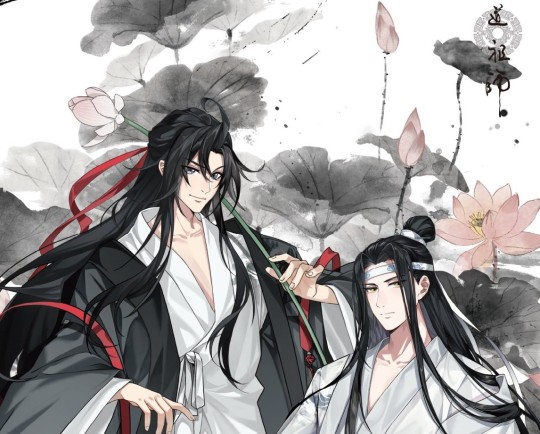
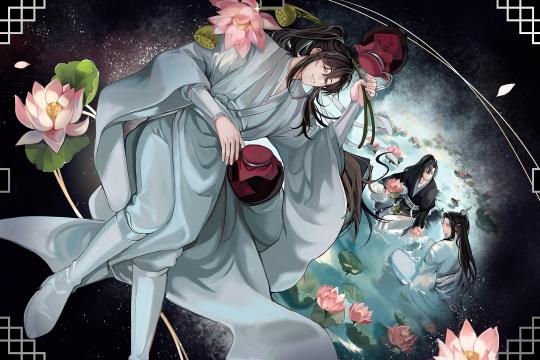
Lotuses are the most commonly referenced flower in MDZS, and they are generally associated with the Yunmeng Jiang clan. This is due to the clan's insignia, a nine-petaled lotus, as well as the name of their residence, Lotus Pier. According to the novel, the compound is surrounded by “pink blossoms with broad jade-green leaves rose from the depths of the lake, whose waters spanned hundreds of kilometres […] giving the lovely scenery a sort of charming innocence” (MXTX, v. 3, p. 9).
The lotus’ symbolic meanings best embody the characters of Jiang Yanli and Wei Wuxian. > 4,2,1) Jiang Yanli: The flower's symbolic representation of virtue, modesty, innocence, beauty, faith, grace, and purity of the heart perfectly conveys Jiang Yanli's kind and caring demeanour. Jiang Yanli's relationship with Jin Zixuan is a key aspect of her character. The lotus' symbolism of love, union, marriage, and a shared heart corresponds with this. Additionally, in both the web drama and MDZS Q, Jin Zixuan grows lotus flowers as a gift for Jin Yanli. > 4,2,2) Wei Wuxian: Wei Wuxian's life can be divided into three parts: his time as the first disciple of the Jiang clan, his time as the Yiling Laozu, and his life after his resurrection as Mo Xuanyu. During his youth with the Jiang clan, he was a promising upcoming cultivator with a humble background. Despite displaying a mischievous and carefree attitude, he was intelligent, dedicated, virtuous and possessed a strong sense of justice. This ties into the lotus’ symbolism of flowing with life's rhythms, wisdom, perseverance, virtue and beauty from humble beginnings. As the Yiling Laozu, he defies convention by developing an unorthodox cultivation path that deviates from the norm. This corresponds with the lotus' symbolism of the continuous pursuit of knowledge, wisdom and achieving great things. He is determined to protect the innocent regardless of prejudicial beliefs—however, this sense of justice renders him capable of brutality at times. This is what inevitably results in him being seen as an outcast in the cultivation world. Ultimately, his power overwhelms him, causing many casualties given that “no one can walk along a single-plank bridge their entire lives and never fall” (MXTX, v. 2, p. 173). This turn of events all juxtaposed against the lotus’ symbolism of preserving stability in the face of change and achieving ultimate purity of mind and heart. After his resurrection, as a result of his experiences as both a hero and a pariah to the cultivation world, Wei Wuxian sees nuance where many do not and often expresses regret and admits his faults—“You’re not the only ones who remember what I’ve done. I remember too. You won’t forget—what makes you think I will?” (MXTX, v. 4, p. 174). This ties into the lotus’ symbolism of wisdom, constant growth and spiritual progress as well as the continuous cycle of life, death, and rebirth. Additionally, his courtesy name Wuxian (无羡) is derived from the last line of a poem by Xu Ben which translates to “to be free of envy and aspire to greater heights; not be misguided by honorary reputation and personal gain”. This ties into the lotus’ symbolism of maintaining inner purity and virtuous behaviour in the face of worldly temptations.
-> 5) Peony
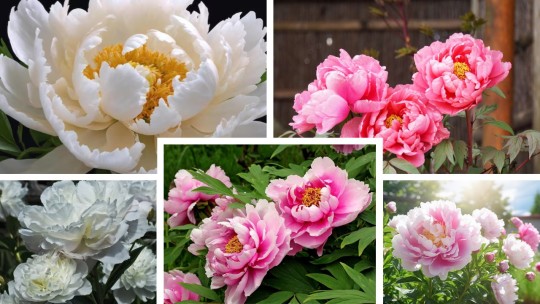


-> 5.1.) Peony Symbolism:
Peonies (Paeonia) are known as mǔdān (牡丹) in China and were regarded as China’s national flower during the Tang Dynasty (618 to 907 A.D.). In accordance with this, they symbolise prosperity, honour, wealth and beauty, love and happiness. The Chinese term for peonies means "the most beautiful” while other Chinese names for peonies are "fùguìhuā" and "huawang," which translate to "king of the flowers" and "flower of riches and honour," respectively. In Japan, peonies are called botan (牡丹) and symbolize shyness, wealth and regalness in hanakotoba. The flower's profound appearance, notably its multitudes of large petals that are thin and silk-like, is where the peony’s symbolism of wealth and regalness originated. In Western floriography, peonies represent bashfulness and compassion.
-> 5.2.) Peonies in MDZS:
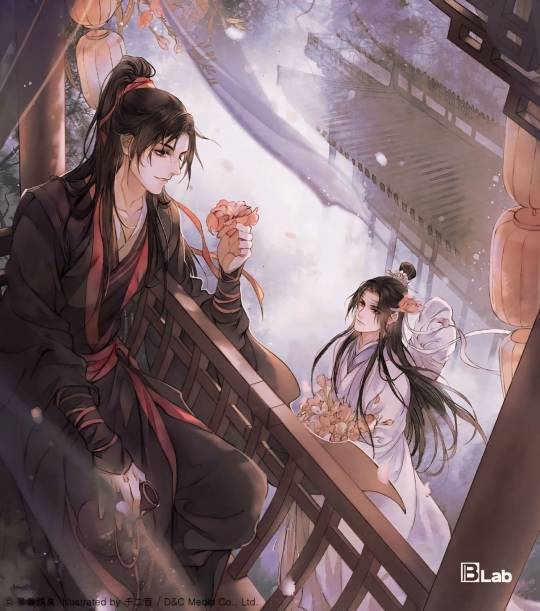
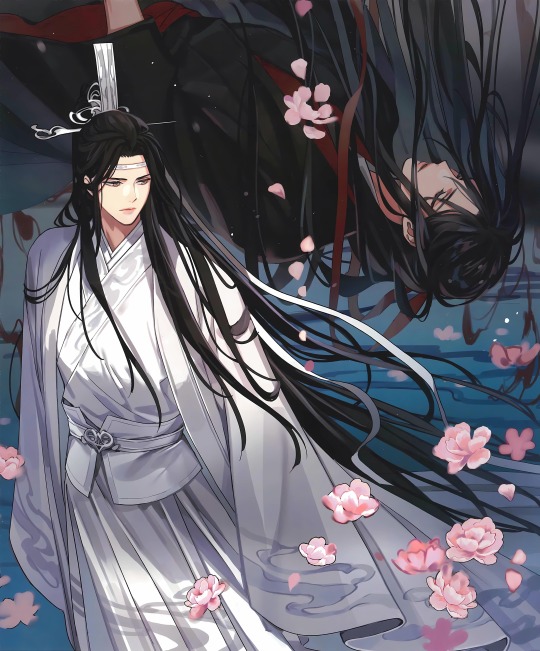
In the series, a white peony cultivar named “Sparks Amidst Snow” is used as the symbol of the Langling Jin Clan. It is said that “by comparing themselves to the king of flowers, they implied they were kings among immortals” (MXTX, v.1, p. 65). This ties in with the peony flower’s symbolic meanings of prosperity, wealth, honour and regalness. Furthermore, pink peonies are often associated with the novel’s central love story between Wei Wuxian and Lan Wangji. During the Siege Hunt at Mount Baifeng, Wei Wuxian throws a pink peony to Lan Wangji amidst the parade. Later, while on a trip to Yunmeng, the latter once again encounters Wei Wuxian who throws him another pink peony. In this audio drama adaptation of this scene, Wei Wuxian asks a ghost woman what the meaning of peony is, and she responds that it means "wishing you would return my feelings" or to part with a heavy heart." Years later, following Wei Wuxian's death and resurrection, he finds a pressed peony flower that Lan Wangji uses as a bookmark. This peony was noted by Wei Wuxian as being “extremely well preserved, [with] the colours still vivid and the veins on its petals so delicately textured that it still looked alive” (MXTX, v. 3, p. 191). Given Lan Wangji's sentimental nature, this peony is undoubtedly one of those given to him by Wei Wuxian. The flower’s association with the pair ties into its symbolic meanings of love, compassion, and happiness.
-> 6) Willow Tree
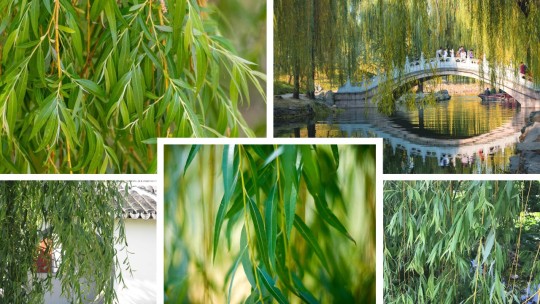


-> 6.1.) Willow Tree Symbolism:
Willow trees are known as liǔ (柳) in China. They are regarded as a symbol of friendship, long-lasting affection, and "urging someone to stay." Willow trees are also connected with spring, therefore they can represent renewal, resilience, the cyclical cycle of existence and the revival of life after a dormant period in winter. Additionally, the willow tree's supple branches can convey an image of meekness and humility. The willow tree's interwoven branches symbolise the depth of friendship because similarly to how branches connect and support one another, genuine friendship is also based on trust, understanding, and mutual support. The willow tree is also associated with separation from loved ones, prompting feelings of sorrow and longing. Willow branches are commonly utilised in Chinese funeral rites as a symbol of grief and remembrance. Willows, known in Japan as yanagi (柳), represent obedience, independence, and the melancholy of love in hanakotoba. The willow’s symbolism of obedience is derived from how its leaves sway in the wind. In contradiction with this, its symbolic meaning of freedom also stems from how freely its leaves sway in the wind. In Western floriography, willows are associated with both freedom and sadness. Weeping willows in particular represent grief, melancholy, and mourning.
-> 6.2.) Willow Trees in MDZS:


Given its symbolic meanings, willow trees can be associated with Jiang Cheng and Wei Wuxian’s complicated, but strong dynamic. This is supported by Wei Wuxian specially mentioning a willow tree when remising about his youth spent in Lotus Pier with Jiang Cheng—“there was an old willow tree rooted on the bank, with a thick, sturdy trunk that slanted over the water and branches that trailed onto its surface. The boys of Lotus Pier would often walk along the trunk of this particular willow tree to sit and fish from the treetop” (MXTX, v. 3, p. 109). While the duo's bond started as one of trust, support, and mutual understanding, it has distorted into one of melancholy, mourning, and longing. This juxtaposition encompasses all of the willow's connotations across various cultures. The willow’s association with spring, renewal, resilience and revival could be indicative that Jiang Cheng and Wei Wuxian’s bond could be repaired if given time, considering that they never properly reconciled because of Jiang Cheng’s reluctance—“But just as the Wei Wuxian of the past who’d extracted his golden core for Jiang Cheng had been unable to tell him the truth, the Jiang Cheng of the present could no longer bring himself to speak up” (MXTX, v. 5, p. 127).
◣━━━━━━━━━◢✿◣━━━━━━━━━◢
╰┈➤ Part 1
╰┈➤ TGCF Hanakotoba Post Part 1
╰┈➤ Other Hanakotoba Posts
[Please check out part 1 as well! If anyone has any ideas on what anime/anime theme song I should cover next in this series please lmk✿ Also, if you liked this post, check out my other hanakotoba analysis posts... Lastly, if I've gotten any of the kanji, romaji, hanzi or pinyin incorrect, feel free to correct me]
#mdzs#mo dao zu shi#grandmaster of demonic cultivation#the grandmaster of demonic cultivation#mxtx#mxtx mdzs#mo xiang tong xiu#donghua#danmei#anime#anime hanakotoba#hanakotoba#floriography#hanakotoba analysis#mdzs donghua#wei wuxian#wei ying#lan wangji#lan zhan#wangxian#wuji#wei wuxian x lan wangji#wei ying x lan zhan#jin zixuan x jiang yanli#jiang yanli#jiang cheng#jin clan#jiang clan#mdzs wwx#mdzs lwj
58 notes
·
View notes
Text
Random thought of the day:
Radiant happiness 🥹





Source
20 notes
·
View notes
Text
Started learning the concertina this year and had to learn this classic 😌
13 notes
·
View notes
Text
Idk who it was but thank you
#happy (late) birthday hanguang-jun!#it was wei wuxian who sended it right? they called 'my husband'#lan zhan#lan wangji#wangxian#wuji#wei wuxian#wei ying#the untamed#mdzs#mo dao zu shi#hanguang jun
88 notes
·
View notes
Text
thhe problem with being a multishipper is that i want all of my ships to be in the same work at once in a polycule except thats so statistically unlikely that out of 58k fics theres like 5 that qualify, but 3 are unfinished, 2 of those are 1k words combined, 1 is a crossover in a fandom im not from, and the last is formatted extremely poorly. i read all of them.
this is an increasing problem that directly equates to the number of people in the polycule.
i am now projecting my polycule onto every other fic i read.
#polythieves is real TO ME#polythieves#persona series#thanzagmeg#hades game#svsss#bingliushenmoshang#bingliushen#mdzs#wangxiansangyu#wangxianyu#wangxian#wuji#xianle quartet#hamugis#yukaham#yukamitsu#shinjiham#akishinji#multishipper#multishipping#fandom
91 notes
·
View notes
Text
#shiyue wang#xinyu liu#IT'S WANGXIAN ON ICE OKAY?!#ice dance#📻 xks.radio#wangxian#wuji#wangxian.mp3#wuji.mp3#the untamed#cql#mdzs#mdzs donghua#grandmaster of demonic cultivation
10 notes
·
View notes
Text




wangxian social media au where wwx, chaos incarnate, returns from his two-month suspension, becomes the talk of the town, and promptly decides to join the school publication team. oh and he’s exes-but-not-really-no-one-knows with lwj, who’s a student athlete.
i’d initially planned to post this on twt as a thread before i found out about the shitty update
should i??? or should i not…??
#mdzs#mo dao zu shi#danmei#grandmaster of demonic arts#lan wangji#wangxian#socmed au#social media au#wuji#campus journalism#student athlete#au#social media#twitter au#thread fic#socmed threadfic#grandmaster of demonic cultivation#the untamed#fanfiction#fanfics
42 notes
·
View notes
Text
More Wuji recording BTS posted by Cheng Yi.
I'm too lazy to put together a post about the translation and background so I'll just link to Vic's post about it. 😅
Cheng Yi's posts have been somewhat controversial in the past. You can read more about that here.
77 notes
·
View notes